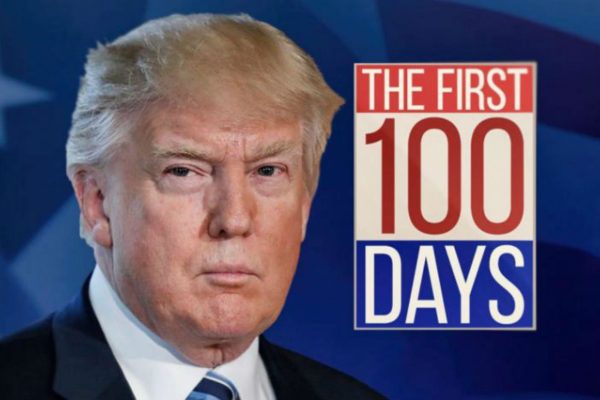Never before in modern American history have we known less about a presidency after its first 100 days than now. At its century mark, the Trump administration remains an enigma. Its ideological convictions, competence level, priorities and most influential voices are all uncertain, perhaps even more so now than on Inauguration Day. In the crucial realm of national security the signs are particularly mixed.
For conservatives, of whom I am one, the first 100 days of the Trump presidency simultaneously bring much to applaud and much to lament on foreign and defense policy. On the positive side, there are several encouraging developments such as:
• President Donald Trump’s appointments of capable professionals to senior national security positions, which include National Security Adviser H.R. McMaster, Secretary of Defense James Mattis, Secretary of State Rex Tillerson, Director of National Intelligence Dan Coats, CIA Director Mike Pompeo, Ambassador to the United Nations Nikki Haley and Homeland Security and Counterterrorism Adviser Tom Bossert. Each of these individuals is exceedingly competent, a principled conservative and a dedicated patriot. They represent the type of national security team that one might have expected from a Marco Rubio or Jeb Bush presidency – and these appointments suggest that Trump is serious about restoring America’s strength, credibility and values athwart a globe in turmoil and uncertainty about American leadership.
• Trump’s ordering of the recent cruise missile strikes on Syria to punish the Assad regime’s chemical weapons use. The dispatch with which he made these decisions is an especially welcome contrast with former President Barack Obama’s hand-wringing passivity toward Syria, which squandered America’s credibility while Bashar Assad murdered more than 400,000 of his own citizens and deepened an unholy alliance with Iran and Russia.
• Trump’s deference to our military leadership on operational matters, particularly his loosening of the rules of engagement in our war on the Islamic State group, and his refusal to micromanage our theater commanders in their efforts to take the fight to our terrorist enemies.
• His affirmation of the importance of America’s alliances with like-minded free nations, such as our allies in NATO and the Asia-Pacific.
But as laudable as all of these things are, they stand in contrast with some countervailing points that for conservatives and many other Americans elicit significant concern:
• There appears to be a pervasive dysfunction afflicting the West Wing, ranging from the appointments of some advisers of questionable competence and integrity such as former National Security Adviser Mike Flynn, to the debilitating feuds that reportedly characterize the jockeying for power between officials such as Jared Kushner, Steve Bannon, Reince Priebus and Gary Cohn.
• Trump’s disparagement of valued American allies and partner nations such as Australia, Germany and Mexico. Each one represents a pillar of American influence in its respective region, and showing public disrespect to their leaders undermines America’s interests and ability to project power.
• Trump’s unilateral concessions to our strategic competitor China, such as withdrawing from the Trans-Pacific Partnership and staying silent on China’s authoritarian abuses of human rights and religious freedom, only further embolden China’s aggressive behavior in the Asia-Pacific.
• Trump’s personal refusal to condemn Russia over its brazen interference in America’s democratic processes, its ongoing efforts to undermine our European allies, its support for Iran and its annexation of portions of Ukraine. This also emboldens Vladimir Putin to engage in further malicious behavior, just as it undercuts those other members of Trump’s administration such as Tillerson who have confronted Russia.
• Trump’s gratuitous endorsement of Turkish President Recep Erdogan’s dictatorial power grab, which encourages Erdogan’s pursuit of an Islamist agenda that is eroding Turkey’s democracy and undermining NATO solidarity.
Of these “two Trumps,” which one will emerge as our president for the next four years is anyone’s guess. In some sense, Trump’s first 100 days in office have actually functioned as the pre-inauguration transition period of more conventional presidencies, rather than an ambitious start to governing. It is clear that Trump himself was quite surprised by his election victory, and thus unprepared for assuming the daunting responsibilities of commander-in-chief, diplomat-in-chief and first customer of the Intelligence Community.
The transition period succumbed to false starts and internecine feuding, while the three months since his inauguration have already brought multiple policy reversals and changes of direction, even as he has not yet filled the vast majority of senior positions at the State Department and Pentagon that are so essential for protecting our nation.
Going forward, pessimists can point to Trump’s erratic decisions and disparagement of America’s allies and international leadership role, while optimists can plausibly cite his first-rate national security team and his willingness to act boldly in defense of American interests and values. Whether the optimists or pessimists will be proved right is an answer that the president himself will determine over the next four years, as he settles in to the most consequential role of his life.
William Inboden is executive director of the Clements Center for National Security and associate professor at the LBJ School of Public Affairs at The University of Texas at Austin. He previously served at the State Department and on the National Security Council staff in the George W. Bush administration.
A version of this op-ed appeared in the Dallas Morning News.
To view more op-eds from Texas Perspectives, click here.
Like us on Facebook.




